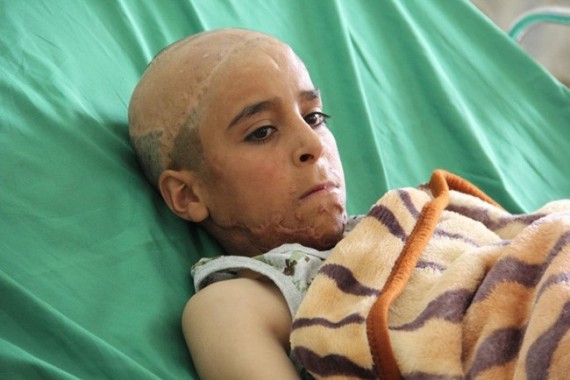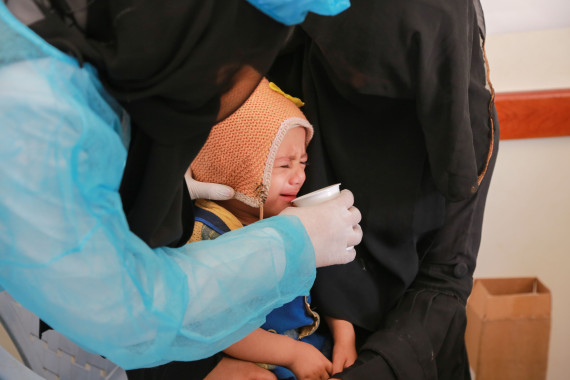
In Yemen, The Cholera Epidemic Is Only Just Scratching The Surface
By
e country where I was born, where my father met my mother, where the most fertile land in the Arabian peninsula lay – is today facing the world’s worst cholera outbreak. The deadly disease has killed nearly two thousand people and hospitalised tens of thousands of families and children.
This week the number of suspected cholera cases will hit the devastating half a million mark.
Hameed is one of the children affected. With a weak immune system, after an accident three years ago which resulted in the amputation of his left arm, he has already been hospitalized for cholera twice in the last few weeks. His father, Faraj vented his frustration saying “there is little we can do to prevent him from falling sick.”

Hameed, 12, lies on a bed in the Thula Public Hospital, north of Sana’a, Yemen. Two and a half years ago, Hameed sustained a severe electric shock during armed clashes in his town, which weakened his immune system and left him more susceptible to diseases like cholera. © UNICEF Yemen/2017
But the cholera epidemic is just scratching the surface of Yemen’s complex problems.
The two and half year war has left 80 per cent of the population in need of humanitarian aid and almost two million children are suffering from severe acute malnutrition.
Two years ago I visited a refugee camp in neighbouring Djibouti with UNICEF, meeting Yemenis who had fled across the Red Sea to escape the violence. I spoke to children living in the camps and met families torn apart by the war.

When we met the family was desperately worried for Fatouma and the grandmother’s wellbeing; for their safety and ultimately their lives. I remember talking to Jawaher, as we walked around the barren desert camp, about how her life had changed since being in Yemen and she told me again and again how much she missed her big sister. Two years later I can only imagine what her family, as well as others living through the crisis, have been through as the situation has continued to deteriorate.

Years of under-investment in deteriorating public water and sanitation systems, contaminated water sources, ongoing waves of displacement resulting from conflict, alongside families being unable to afford basic sanitation and hygiene items, have contributed to this recent cholera outbreak. Let’s be under no illusion – this is crisis man-made.
UNICEF is calling for the Yemeni authorities to urgently pay the 300,000 health workers who are key to combating the spread of this disease. If this doesn’t happen children will continue to suffer the most.
But there is hope. More than 99 per cent of those with suspected cholera can access health services and are now surviving. This is in no small part down to the work that aid agencies are doing. One of the main ways of beating cholera is by using oral rehydration salts – UNICEF is currently supplying the stock for the entire country.

UK aid has played a big part in this response. In April, the UK government increased UK aid to Yemen to £139 million for 2017/18, a substantial increase from previous support.. But for organisations like UNICEF there remains a huge gap in the funding needed to help children in Yemen.
What is clear is that we need everyone’s support to beat this cholera outbreak. I hope we can soon see an end to this terrible outbreak of cholera, and of course and end to the brutal war in Jawaher’s country.
The original source of this article is HUFFPOST
The views expressed in this article belong to the author and do not necessarily reflect the editorial policy of YemenExtra
